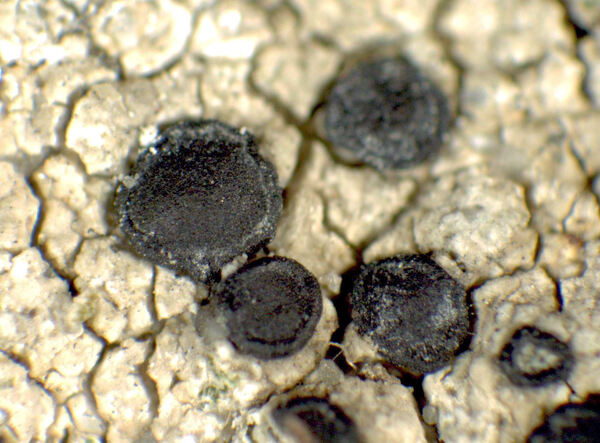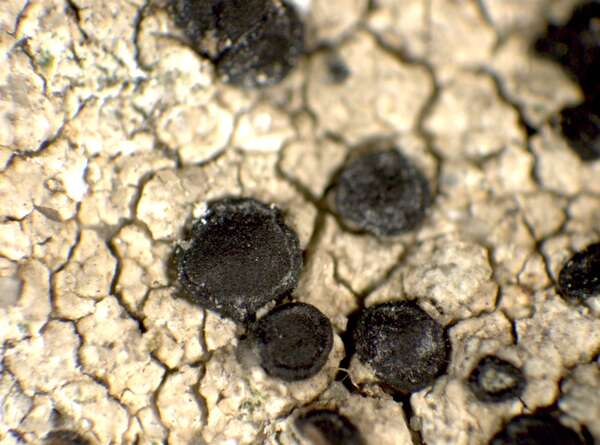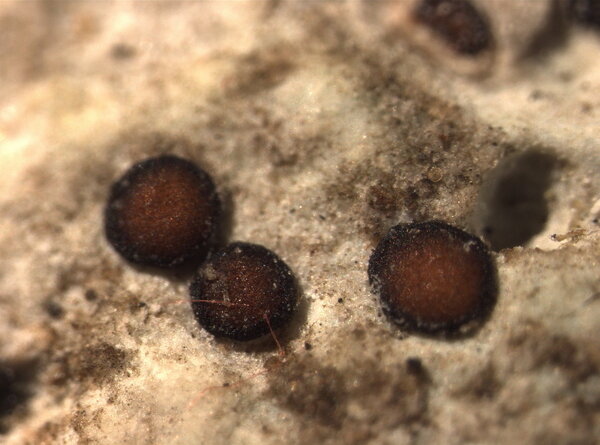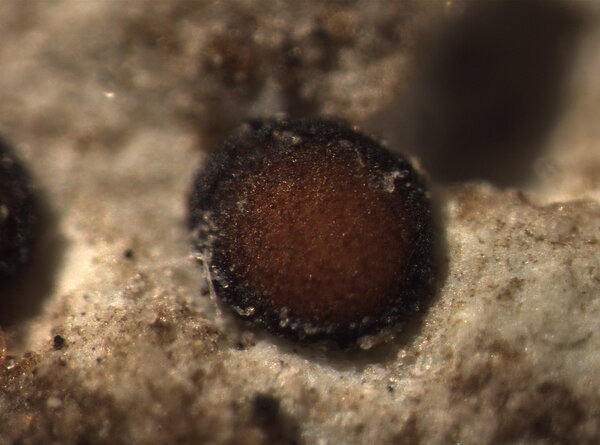Clauzadea chondrodes (A. Massal.) Hafellner & Türk
Clauzade & Cl. Roux ex Hafellner & Türk, Stapfia, 76: 151, 2001. Basionym: Biatora chondrodes A. Massal. - Symmicta Lich.: 39, 1855.
Synonyms: Biatora cyclisca A. Massal.; Clauzadea cyclisca (A. Massal.) V. Wirth; Lecidea chondrodes (A. Massal.) Malbr.; Lecidea cyclisca (A. Massal.) Malbr.; Lecidea savonensis B. de Lesd.; Protoblastenia chondrodes (A. Massal.) Zahlbr.
Description: Thallus crustose, episubstratic to hemiendosubstratic, usually c. 1 mm thick, continuous, white, bluish white, or ochre-coloured, sometimes inapparent, often greenish or blue-green when wet, sometimes surrounded by a white prothallus. Medulla I-, filled with crystals of calcium oxalates and overlain by a distinct epinecral layer of dead, compacted cells. Apothecia lecideine to biatorine, round to irregular in outline, (0.3-)0.5-1.2(-1.5) mm across, slightly immersed in the thallus to subsessile, leaving distinct depressions when falling off, with a black (reddish-brown when moist), usually flat disc, and a very thin, soon excluded proper margin. Proper exciple dark red-brown in outer part, almost colourless within, of more or less radially arranged hyphae, 20-110 µm thick laterally, much thinner at base; epithecium ochraceous to reddish brown; hymenium colourless, 65-132 µm high, I+ reddish and partly pale blue; paraphyses sparingly branched and anastomosing, septate but not moniliform, 4-5.5 µm thick at mid-level, scarcely swollen at apex; hypothecium narrowly stem-like, deeply immersed, colourless to pale brown in upper part, at least partially I+ blue. Asci 8-spored, elongate-clavate, with a thin, outer amyloid layer and a thickened tholus penetrated by a pore, the sides of which stain K/I+ deep blue, Porpidia-type. Ascospores 1-celled, hyaline, ellipsoid, (8-)13-18(-22) x 5-7(-10) µm, with a > 1 µm thick, gelatinous perispore when young, the wall of old spores not warted. Pycnidia black, laminal, immersed. Conidia bacilliform, 4-6 x 1-2 µm, with apical and lateral conidiogenesis. Photobiont chlorococcoid. Spot tests: thallus K-, C-, KC-, P-, UV-. Chemistry: without lichen substances.
Growth form: Crustose
Substrata: rocks
Photobiont: green algae other than Trentepohlia
Reproductive strategy: mainly sexual
Commonnes-rarity: (info)
Alpine belt: absent
Subalpine belt: absent
Montane belt: rather common
Dry submediterranean belt: rather rare
Humid submediterranean belt: rare
Padanian area: very rare
pH of the substrata:
1 2 3 4 5
Solar irradiation:
1 2 3 4 5
Aridity:
1 2 3 4 5
Eutrophication:
1 2 3 4 5
Poleotolerance:
0 1 2 3
Altitudinal distribution:
1 2 3 4 5 6
Rarity
absent
extremely rare
very rare
rare
rather rare
rather common
common
very common
extremely common
Loading data...
Occurrence data
Predictive map
Growth form: Crustose
Substrata: rocks
Photobiont: green algae other than Trentepohlia
Reproductive strategy: mainly sexual
Commonnes-rarity: (info)
Alpine belt: absent
Subalpine belt: absent
Montane belt: rather common
Dry submediterranean belt: rather rare
Humid submediterranean belt: rare
Padanian area: very rare
pH of the substrata:
| 1 | 2 | 3 | 4 | 5 |
Solar irradiation:
| 1 | 2 | 3 | 4 | 5 |
Aridity:
| 1 | 2 | 3 | 4 | 5 |
Eutrophication:
| 1 | 2 | 3 | 4 | 5 |
Poleotolerance:
| 0 | 1 | 2 | 3 |
Altitudinal distribution:
| 1 | 2 | 3 | 4 | 5 | 6 |
Rarity
absent
extremely rare
very rare
rare
rather rare
rather common
common
very common
extremely common
Loading data...
Occurrence data
Predictive map










